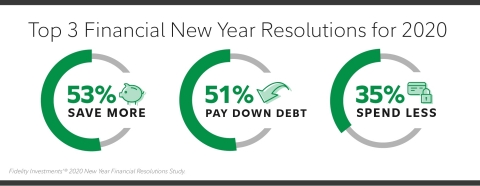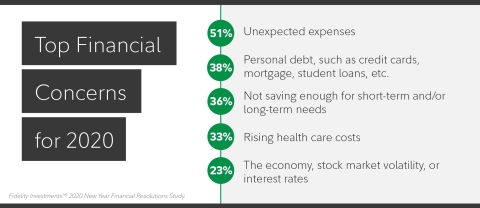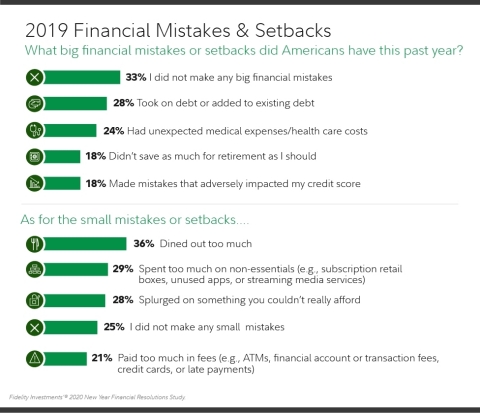BOSTON--(BUSINESS WIRE)--With the start of a new decade just around the corner, Americans are feeling optimistic about their current and future financial situation, but reducing the burden of personal debt will be a priority for many who acknowledge they bit off more than they could chew in 2019. According to Fidelity Investments’® 2020 New Year Financial Resolutions Study, 82% of Americans say they’re in a similar or better financial position this year than last and remain committed to improving their financial position in the New Year. Low unemployment and a stock market that has reached unprecedented heights have likely helped fuel this confidence, but Americans aren’t letting a strong economy take all the credit for their financial success.
Most point to good habits as the major reasons for their improved financial situation in 2019, the biggest being saving more money (47%) and budgeting (29%). One-in-four say they’re getting ahead because they’ve been able to work more hours. Though the markets have continued to reach new highs, only 18% cite having investments that performed well as a key reason for their success.
Adding to the good news: there is a strong desire to keep this positive momentum going into the New Year. A growing number of Americans intend to continue to be mindful of their money in 2020, with 67% considering a financial resolution related to saving, investing, managing debt, budgeting and retirement planning (up from 61% who made a financial resolution for 2019).
The top three financial resolutions, among those considering one, are simple financial principles:
- Fifty-three percent want to save more
- Fifty-one percent want to pay down debt
- Thirty-five percent want to spend less
Interestingly, when asked if they had to choose between reaching a financial goal over other popular personal goals, like weight loss, an overwhelming majority (84%) say they would rather save $5,000 than lose five pounds. (Click here for more financial ‘Would You Rather’ study findings).
“It’s encouraging that Americans are committed to building up their finances and taking additional steps toward meeting their financial goals, with 50% saying they plan to increase their annual retirement savings and 85% planning to build up emergency funds,” said Melissa Ridolfi, vice president of retirement and college products at Fidelity Investments. “A small step like making a resolution for the New Year can go a long way in forming good money habits that can last a lifetime.”
Living a Debt-Free Life a Top Motivator for Making a Financial Resolution
Reducing debt emerged as a prominent focus throughout this year’s study, with 38% of Americans saying their personal debt is a top concern heading into 2020. When asked what motivates them to make financial resolutions, “living a debt-free life” is the biggest motivator (68%), followed by getting control of daily expenses (56%) and having a comfortable retirement (54%). This emphasis on debt reduction could have something to do with the fact that 28% say one of the biggest financial mistakes or setbacks they had this past year included taking on new debt or adding to existing debt.
The silver lining? Notably, when it comes to tightening their grip on debt: at 29% Boomers, more than any other generation, credit being in a better financial situation now compared to this time last year because they refinanced, paid off, or reduced debt or loans. This compares to just 6% of Generation Z, 19% of millennials and 21% of Generation X.
“Boomers are getting the message that the closer they get to retirement, the more essential it becomes to get their debt under control to make the most out of retirement savings,” said Ridolfi.
Top Financial Concerns for 2020
Given the desire by so many to gain more control over their finances, it’s not surprising that “unexpected expenses” top the list of financial concerns in 2020. Financial concerns relating to factors within one’s control include credit card debt and not saving enough.
Dropping the Financial Ball: Top Money Mistakes & Setbacks of 2019
In addition to taking on too much debt, respondents were asked about other common financial mistakes or setbacks made during the past year. Although many Americans (33%) report they did not make any big mistakes this year, the most commonly cited small mistake was dining out too much.
Financial Resolutions: Making Them and Keeping Them
Making a resolution is one thing, keeping it is another. The Fidelity study asked respondents who said they were able to keep their 2019 financial resolutions to share the secrets to their success. Their top tips related to making it easier by setting clear, specific and achievable goals. Learning to enjoy the good feeling of making progress is also a popular tip.
“We see how important a sense of gratification can be in helping people stay motivated to reach their financial goals,” said Ridolfi. “Achieving one small goal can often be the inspiration that leads to even more success down the road.”
Need Help Focusing on Finances? Tips for Getting Started
Those who need help getting started or maintaining their financial resolve don’t have to look any further. Fidelity offers several online resources to help people identify their goals and set themselves up for success in achieving their 2020 financial resolutions:
- Fact Sheet: Includes additional findings from Fidelity’s New Year Financial Resolutions Study.
- Fidelity.com/resolutions: A webpage dedicated to New Year resolutions, including Viewpoint articles on how to set financial goals and stick to a plan.
- Fidelity Retirement Score: Answer six simple questions in this online tool to get a retirement score and see how adjusting certain factors could improve one’s outlook.
- 5 financial things to review annually: A Fidelity Viewpoint that explores five key questions to ask at annual review time.
- How to pay off debt - and save too is a step-by-step guide to paying off debt and saving money.
- Viewpoint article: The real reasons people retire explains how well-being in retirement isn’t just about money or intellectual stimulation, but the freedom to do what one wants, when one wants.
- Fidelity customers can also set and track progress against financial goals in the Fidelity Planning & Guidance Center.
- Life Events: An online experience with tools and resources to help people navigate all aspects of the big milestones or unexpected changes in their lives.
About Fidelity Investments’ 2020 New Year Financial Resolutions Study
This study presents the findings of a national online survey, consisting of 3,012 adults, 18 years of age and older. The generations are defined as: Baby Boomers (ages 55-73), Gen X (ages 39-54), millennials (ages 23-38), and Gen Y (ages 18-22; although this generation has a wider range, we only surveyed adults for the purposes of this survey). Interviewing for this CARAVAN® Survey was conducted October 14-23, 2019 by Engine Insights, which is not affiliated with Fidelity Investments. The results of this survey may not be representative of all adults meeting the same criteria as those surveyed for this study.
About Fidelity Investments
Fidelity’s mission is to inspire better futures and deliver better outcomes for the customers and businesses we serve. With assets under administration of $8.0 trillion, including discretionary assets of $3.0 trillion as of October 31, 2019, we focus on meeting the unique needs of a diverse set of customers: helping more than 30 million people invest their own life savings, 22,000 businesses manage employee benefit programs, as well as providing more than 13,500 financial advisory firms with investment and technology solutions to invest their own clients’ money. Privately held for more than 70 years, Fidelity employs more than 40,000 associates who are focused on the long-term success of our customers. For more information about Fidelity Investments, visit https://www.fidelity.com/about.
Fidelity Investments and Fidelity are registered service marks of FMR LLC.
Investing involves risk including risk of loss.
IMPORTANT: The projections or other information generated by Fidelity Retirement Score regarding the likelihood of various investment outcomes are hypothetical in nature, do not reflect actual investment results, and are not guarantees of future results. Results may vary with each use and over time.
Fidelity Brokerage Services LLC, Member NYSE, SIPC
900 Salem Street, Smithfield, RI 02917
Fidelity Investments Institutional Services Company, Inc.
500 Salem Street, Smithfield, RI 02917
National Financial Services LLC, Member NYSE, SIPC
200 Seaport Boulevard, Boston, MA 02110
905374.1.0
© 2019 FMR LLC. All rights reserved.







